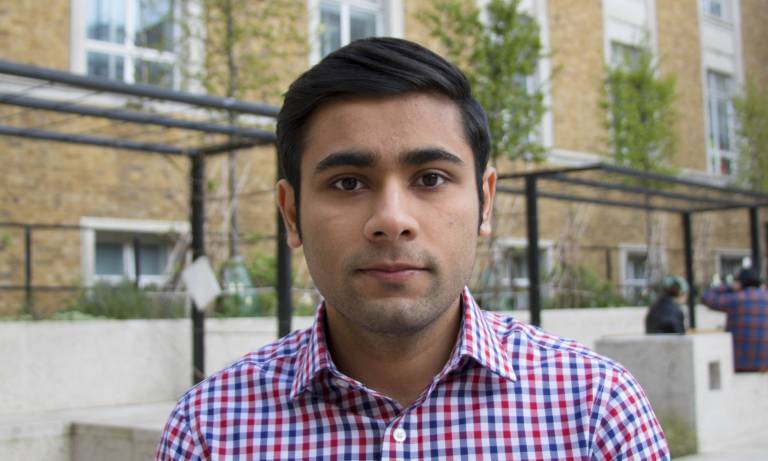Fahm Deen, PhD, UCL Queen Square Institute of Neurology

1. What is your educational background?
I graduated from UCL in September 2018 with a high first-class honours in BSc Biomedical Sciences. Since November 2018, I have been a PhD student at UCL Queen Square Institute of Neurology under Professor Martin Koltzenburg and Dr Liam E Browne.
2. What are your motivations for pursuing a PGR?
I have always found independent research interesting, challenging and especially intellectually stimulating and there cannot be a better opportunity to continue doing this other than a PhD. Acquiring fundamental knowledge on my field of interest i.e. the underlying mechanisms of pain will allow us to treat such conditions in future.
Unlike most students, I took the path less travelled and got the opportunity of pursuing a PhD without a master’s degree. I received the Dean’s Honour award during my undergraduate studies. Besides, my undergraduate research project received the overall highest mark for my year, and I was awarded the prestigious Schafer research prize in Physiology. These achievements were extremely motivating and fundamental in reassuring myself that I have both the knowledge and practical skills required for doctoral study.
3. Why did you apply to UCL Brain Sciences?
I was initially attracted here by my supervisor, Professor Martin Koltzenburg, who is a leading expert in the experimental and clinical neurophysiology of pain and peripheral nerve disease. During my undergraduate research project, I came across his vigour and innovative experimental perspectives that really motivated me to continue work at his laboratory.
After completing a whole year of research in this faculty, I was assured that UCL Brain Sciences consists of internationally renowned scientists who contribute to ground-breaking discoveries and offers world-class facilities not found under one hood elsewhere in the world. I must say, there could have not been a better decision I could have made for myself.
4. What do you find interesting about your field of study and what inspires you?
During placements at different hospitals and clinics, I have noticed that chronic pain continues to be a leading debilitating health problem affecting a significant part of our population. Despite ongoing research, effective treatment is quite inadequate, and I'm intrigued by how much there is to contribute to this field.
Currently, I am working on cancer chemotherapy-induced pain and I am extremely inspired as our research can prevent potentially life-saving cancer treatment being undermined due to side effects.
5. What are your career plans once you’ve completed your current programme of study at UCL?
In the long run, I aspire to become a clinician-scientist and embark on a career in academia where medical research and its translation into improved patient care and treatment forms the central component. After my PhD, I look forward to completing the medical degree and attain my envisioned profession.
6. Do you think studying at UCL Faculty of Brain Sciences is a good investment?
‘Love what you do and live for what you do!’ If you are a motivated and curiosity-driven individual looking for an opportunity to enhance knowledge and develop research skills in the field of Brain Sciences, this is definitely the best investment! It is worth mentioning that UCL has an excellent worldwide reputation and ranks within Top 3 for Neuroscience (and related subjects) in the world. The institution provides all the resources to achieve one’s personal and professional goals both in and outside academia.
7. Have you undertaken any networking opportunities either as part of your degree or outside of your studies?
The Faculty of Brain Sciences provides the opportunity to meet and work with many likeminded, enthusiastic and motivated researchers and students through regular workshops, seminars, interdisciplinary initiatives and symposium events. Till now, I have attended and presented at several international and national conferences. Outside academia, I regularly volunteer and write scientific content over the internet to engage the general public with current research and latest findings.
8. Has there been an element of your degree programme that has impressed you or been particularly valuable?
As a student of UCL, I am very privileged to be around researchers who are top leaders in their respective fields. Constructive discussions and intellectually stimulating debates lead to wonderful learning experiences. Particularly for my PhD, I do lab work at the Institute of Neurology and will be conducting investigations in the Department of Clinical Neurophysiology at the Neurology Hospital (NHNN) which is just next door. This setting allows the translation of findings and principles of my pre-clinical work into mechanistic studies in humans, which remains my ultimate target. Besides, I am quite impressed by the UCL-Yale collaborative exchange scheme, which allows doctoral students to study and conduct research at another world-leading university.
9. If you received funding either through a scholarship, award, studentship or bursary, how has it helped you achieve your aspirations and what impact has it had on your studies?
During my BSc, I received the Schafer Research prize. Currently, I receive funding from the Department of Clinical and Movement Neurosciences of UCL and UCLH. These awards not only solve financial issues but provide me with a sense of satisfaction, pride and happiness. The road to a PhD is not always smooth and during moments of self-doubt, these achievements increase positive emotions such as self-esteem and confidence.
 Close
Close

